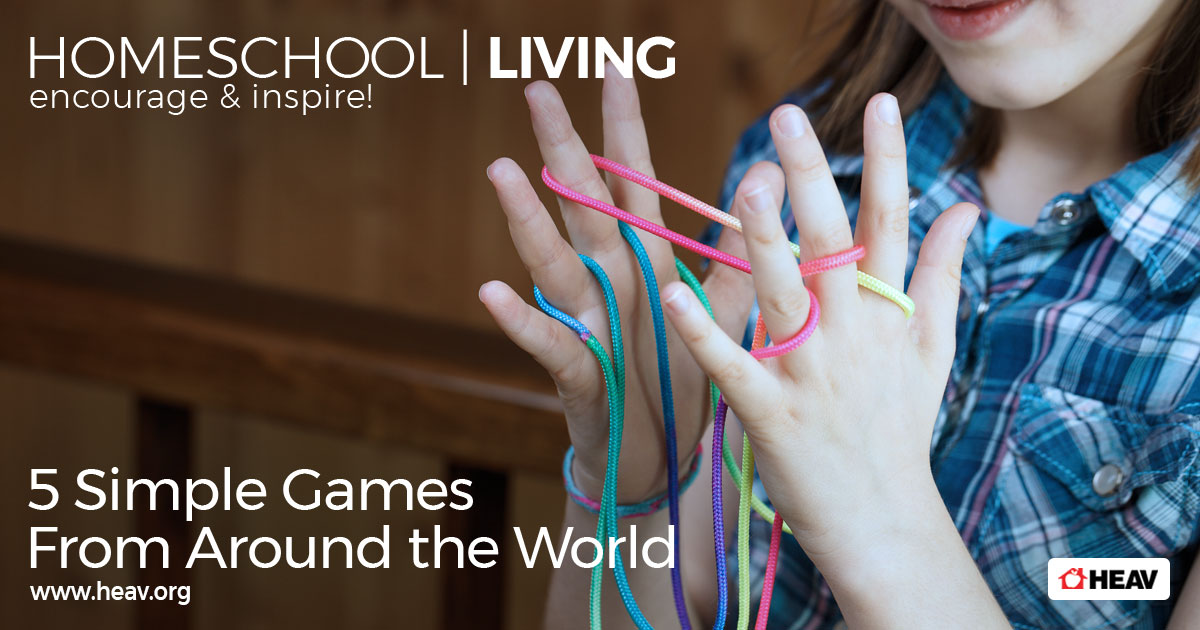Gameschooling: 5 Simple Games From Around the World
Gameschooling is a powerful teaching technique using games and play activities to introduce, reinforce, and practice concepts in all different subjects. It’s become immensely popular for its focus on fostering and encouraging enthusiastic, organic learning, and the flexibility it offers as you incorporate other activities into your homeschool living. However, you don’t need specific board games, advanced computer games, or any special equipment at all in order to impart memorable, meaningful lessons in your homeschool. Share these five simple games from around the world with your kids and help them discover hidden lessons in science, history, geography, art, language, and more.
Gameschooling Geography
1. Pilolo – Ghana
This popular street game from Africa is a combination treasure hunt and race. Someone must hide a small item such as a stick, rock, flower, or coin for each participant somewhere in the playing field. When the game begins, kids race to find one of the hidden objects and bring it across a predetermined finish line. Use items collected during a nature walk for an element of natural science, and check out the history and culture of Ghana for geography and cultural studies.
2. Luta de Galos – Brazil
Incorporate this hilarious game from Brazil into your gameschooling with as few as two players. All you need is a ribbon or bandana for each participant to hang from his pocket. Describe and demonstrate the gameplay, and see if kids can guess the translation for the name before you tell them–or have them do a little research to figure it out! (It’s Portuguese for “fight of the roosters.”)
3. Catch The Dragon’s Tale – China
This variation of tag, from China, is best with a larger group, so this is a great game to play at a family gathering or co-op meeting. It can be fun for younger kids to come up with other animals they could be playing as, and this is a great way for preschoolers and kindergarteners in particular to learn about and practice observing similarities and contrasts. For example, the animal for this game would need to have a long body or tail, such as a snake, eel, caterpillar, tiger or alligator, as opposed to something shorter and squatter, like a butterfly, owl, or beaver.
4. Shadows – Ireland
Shadows is another variation of the classic game of tag, this time from Ireland, and lends itself to some fun science observations about light and shadow patterns. The aim of the game is for “it” to to tag the shadows of other players, rather than the players themselves. See if the kids figure out that they can crouch down, turn sideways, and otherwise manipulate their shadows to create a smaller target. Talk about why that strategy works, and how the direction and location of the light source changes their shadow’s shape and size. You can play this outdoors on a sunny day, or indoors with a bright light (or one with the shade removed).
5. Agalmata – Greece
This game from Greece is an interesting observation on how the surrounding environment informs the gameplay. Statues are a huge part of Greek culture and architecture, and ancient Greek statues have become some of the most recognizable art pieces across the world. This game–aptly named Agalmata, or “statues” in Greek–revolves around players replicating poses they’ve seen in their surroundings. Take the opportunity to visit a museum if you can, or check out pictures of famous statues online or at the library. If you want to reinforce the visual for a few pieces, you might play a few rounds in which “it” calls out the name of a statue for the other players to replicate, which is a great way to help students remember and later recognize specific pieces. (In normal gameplay, the players simply freeze into whatever pose they choose).
Megan Mora Fuentes
Enjoy this article?
For more insightful and encouraging homeschool related articles, homeschool living tips, and homeschool connections, please visit our HEAV blog. Click here!








